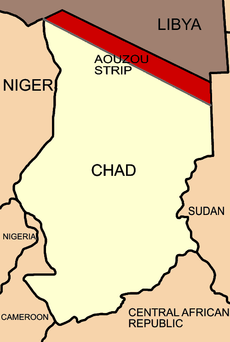
The Aouzou Strip is a strip of land in northern Chad that lies along the border with Libya, extending south to a depth of about 100 kilometers into Chad's Borkou, Ennedi Ouest, Ennedi Est, and Tibesti regions for an area of 114,000 km2. It is named after the small town and oasis of Aouzou. The strip played a significant role in the Chadian–Libyan War when it was claimed by Libya.

United Nations Security Council resolution 986, adopted unanimously on 14 April 1995, after reaffirming all resolutions on Iraq and noting the serious humanitarian situation with the Iraqi civilian population, the council, acting under Chapter VII of the United Nations Charter, established a mechanism whereby Iraqi oil exports would finance humanitarian aid to the country, which later became known as the Oil-for-Food Programme.
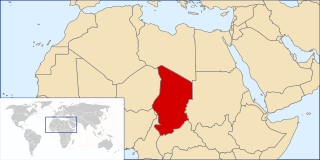
The Chadian–Libyan War was a series of military campaigns in Chad between 1978 and 1987, fought between Libyan and allied Chadian forces against Chadian groups supported by France, with the occasional involvement of other foreign countries and factions.

The Case Concerning the Territorial Dispute [1994] is a public international law case decided by the International Court of Justice (ICJ) concerning the border between the Libyan Arab Jamahiriya and the Republic of Chad. The case was put forward to settle a territorial dispute between the two countries, particularly over a strip of land called the Aouzou Strip which Libya had occupied since the Chadian–Libyan War, and an area which Libya called the Libya–Chad Borderlands or simply the Borderlands. Libya's claim to the Borderlands included parts of the regions of Borkou, Ennedi and Tibesti, including parts of the localities of Erdi, Kanem and Ounianga. It also covered the Chadian region of B.E.T., excluding northern Kanem.
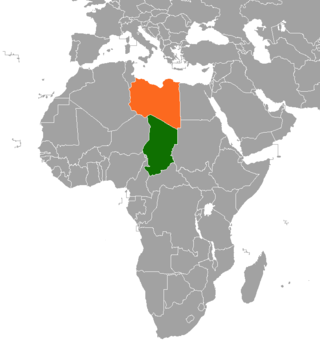
Chad–Libya relations have arisen out of centuries from ethnic, religious, and commercial ties.

United Nations Security Council resolution 862, adopted unanimously on 31 August 1993, after recalling resolutions 841 (1993), 861 (1993) and an agreement between the President of Haiti and the Commander-in-Chief of the Armed Forces of Haiti, the Council reaffirmed the international community's commitment to a solution in Haiti and discussed the establishment of a new police force in Haiti under a proposed United Nations Mission in Haiti (UNMIH).
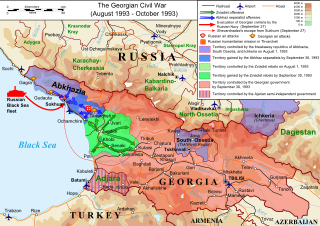
United Nations Security Council resolution 876, adopted unanimously on 19 October 1993, after reaffirming resolutions 849 (1993), 854 (1993) and 858 (1993) concerning the Georgian–Abkhazian war, the council determined that the situation continued to constitute a threat to international peace and security.
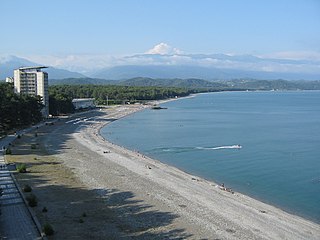
United Nations Security Council resolution 881, adopted unanimously on 4 November 1993, after reaffirming resolutions 849 (1993), 854 (1993), 858 (1993) and 876 (1993) concerning the Georgian–Abkhazian war, the Council extended the mandate of the United Nations Observer Mission in Georgia (UNOMIG) until 31 January 1994.

UN Security Council Resolution 883, adopted on 11 November 1993, after reaffirming resolutions 731 (1992) and 748 (1992), the council noted that, twenty months later, Libya had not complied with previous Security Council resolutions and as a consequence imposed further international sanctions on the country.

United Nations Security Council resolution 902, adopted unanimously on 11 March 1994, after receiving a report from the Secretary-General Boutros Boutros-Ghali pursuant to Resolution 880 (1993), the council discussed confidence-building measures between the Republic of Cyprus and Northern Cyprus with the aim of resolving the Cyprus dispute.

United Nations Security Council resolution 915 was adopted unanimously on 4 May 1994. While reaffirming Resolution 910 (1994), the Council, acting on a recommendation by the UN Secretary-General Boutros Boutros-Ghali, established the United Nations Aouzou Strip Observer Group (UNASOG) to supervise the withdrawal of Libyan forces from the Aouzou Strip following an International Court of Justice opinion rendered in the Libya–Chad Territorial Dispute case that the strip formed part of the territory of Chad.
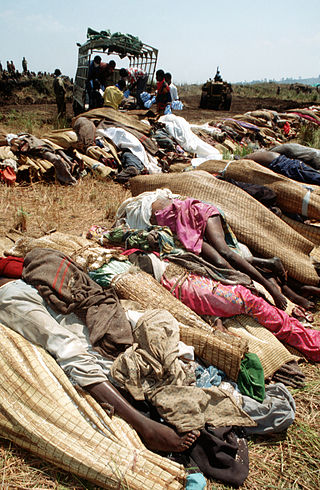
United Nations Security Council resolution 925, adopted unanimously on 8 June 1994, after reaffirming all resolutions on the situation in Rwanda, particularly resolutions 912 (1994) and 918 (1994), and Resolution 868 (1993) on the safety of United Nations peacekeepers, the council deployed additional battalions and extended the mandate of the United Nations Assistance Mission for Rwanda (UNAMIR) until 9 December 1994.

United Nations Security Council resolution 926, adopted unanimously on 13 June 1994, after reaffirming Resolution 915 (1994), the Council commended the work of the United Nations Aouzou Strip Observer Group (UNASOG) and the co-operation of Libya and Chad and decided, with immediate effect, to terminate the UNASOG mission in the Aouzou Strip.

United Nations Security Council resolution 935, adopted unanimously on 1 July 1994, after recalling all resolutions on Rwanda, particularly 918 (1994) and 925 (1994), the Council requested the Secretary-General Boutros Boutros-Ghali to establish a Commission of Experts to investigate violations of international humanitarian law during the Rwandan genocide.

United Nations Security Council resolution 942, adopted on 23 September 1994, after reaffirming all resolutions on the situation in Bosnia and Herzegovina, the Council reinforced measures relating to safe areas under control of Bosnian Serb forces.

United Nations Security Council resolution 965, adopted unanimously on 30 November 1994, after reaffirming all resolutions on the situation in Rwanda, particularly resolutions 872 (1993), 912 (1994), 918 (1994), 925 (1994) and 955 (1994), the Council extended the mandate of the United Nations Assistance Mission for Rwanda (UNAMIR) until 9 June 1995 and expanded its operations.

United Nations Security Council resolution 971, adopted unanimously on 12 January 1995, after reaffirming resolutions 849 (1993), 854 (1993), 858 (1993), 876 (1993), 881 (1993), 892 (1993), 896 (1994), 901 (1994), 906 (1994), 934 (1994) and 937 (1994), the Council extended the United Nations Observer Mission in Georgia (UNOMIG) until 15 May 1995.

United Nations Security Council resolution 988, adopted on 21 April 1995, after reaffirming all resolutions on the situation in the former Yugoslavia, in particular resolutions 943 (1994) and 970 (1995), the Council noted measures by the Federal Republic of Yugoslavia to continue the border closure with Bosnia and Herzegovina and therefore extended the partial suspension of sanctions against Serbia and Montenegro for a further 75 days until 5 July 1995.

The Chad–Libya border is 1,050 km in length and runs from the tripoint with Niger in the west, to the tripoint with Sudan in the east.

The United Nations Aouzou Strip Observer Group (UNASOG) was a United Nations observation mission that was deployed to the Aouzou Strip, in the Republic of Chad. Established in the wake of the Aouzou Strip dispute under Security Council Resolution 915 of 4 April 1994, the mission's mandate was "to verify the withdrawal of the Libyan administration and forces from the Aouzou Strip in accordance with the decision of the International Court of Justice", rendered on 3 February 1994 in the Libya–Chad Territorial Dispute case.
